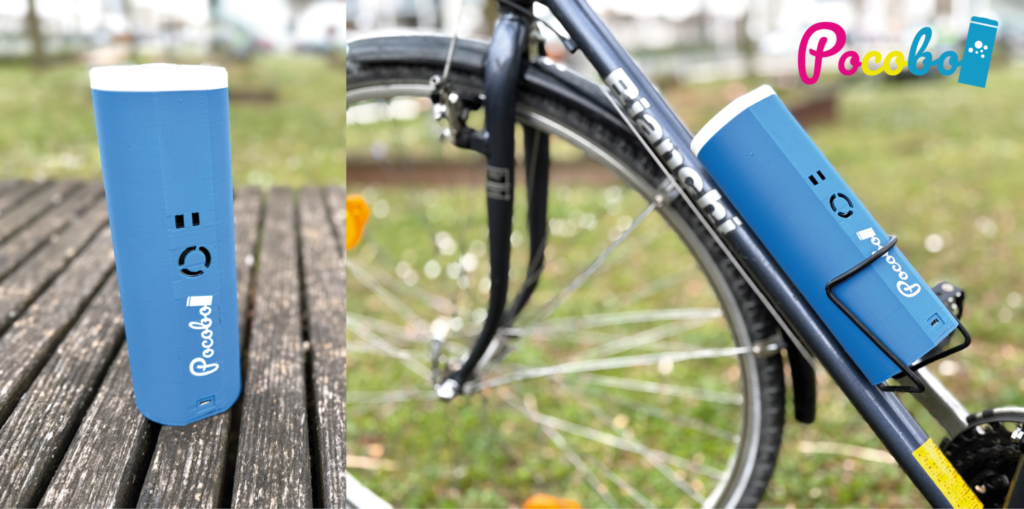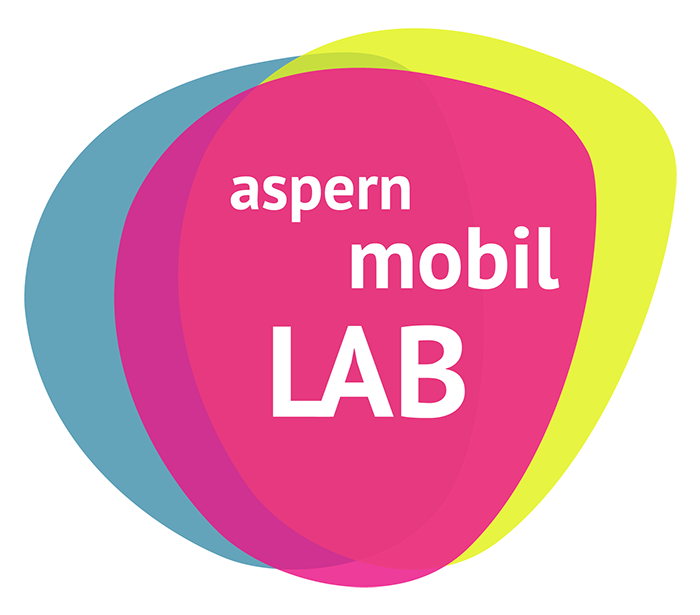Pocobo
Air Pollution Data Collection Bottle
We want to raise awareness of air pollution among city dwellers by motivating cyclists to collect local air quality data while cycling through the city. The aspern.mobil LAB’s DIY tool, Pocobo, can easily be carried around in a bottle cage and measures particulate matter levels while cycling.
In addition to PM10, PM2.5, PM4, and PM1 particulate matter values, temperature, and humidity are also recorded. The device also has a GPS module and offers the option of transmitting the data wirelessly via the mobile network to our DATAhub, where it is stored, processed, and analyzed.
The developed prototype of the bicycle air quality sensor acts as a feasibility study to explore the possibilities and pitfalls of mobile air quality monitoring by cyclists and pedestrians as a citizen science project.

© aspern.mobil LAB
The design process followed a user-centered design approach, the most important feature of which is the continuous involvement of potential end users.
At every step of the design process, users were encouraged to help shape the physical form of the device itself, as well as the interaction with the sensor and the connected online services.
The device itself was designed to fit into a standard bottle holder – an idea put forward by an interview participant during the initial design phase. The resulting design allows the sensor to be mounted on most – if not all – bicycles, but also on baby carriages with bottle cages, for example. Many bicycles are already equipped with bottle cages or at least have mounting holes prepared for this purpose. Even in the event that a bike does not have the appropriate mountings, there are solutions that allow a bottle cage to be fitted in all possible positions without the need for modifications to the bike.
The attachment and position of a water bottle on the bike is a tried and tested concept, making it relatively easy to ensure that the sensor does not become a disruptive factor for cyclists. At the same time, the solution also allows for stable attachment and simple, quick removal – two aspects that users mentioned as prerequisites for good usability.
The collection of localized air quality data by a large number of urban cyclists will subsequently enable the data to be used for a variety of purposes. The information can be made available to the public DATAhub. This is a digital city map that shows the air quality in an area at a specific point in time. Alternatively, the data can be used to estimate the impact of air pollution on individual cyclists on their daily routes and allow them to plan their routes depending on the expected pollution levels.
Through our approach, we hope to raise awareness of the importance of air pollution and encourage people to change their personal habits towards sustainable mobility.
For building your own Pocobo 2, the following parts are needed:
- Arduino MKR NB 1500 (https://www.arduino.cc/en/Guide/MKRNB1500)
- NB-IoT SIM card with data package
- Sensirion SEN54 PM Sensor (https://www.sensirion.com/products/catalog/SEN54)
- Adafruit Mini GPS PA1010D Module (https://learn.adafruit.com/adafruit-mini-gps-pa1010d-module)
- Dipole Pentaband Waterproof antenna (https://store.arduino.cc/en-at/products/dipole-pentaband-waterproof-antenna?queryID=undefined
- 3.7V, 2000mAh Battery (https://eckstein-shop.de/LiPo-Akku-Lithium-Ion-Polymer-Batterie-37V-2000mAh-mit-JST-PHR-2-Stecker-LP803860)
- Adafruit Powerboost 500 Charger (https://www.adafruit.com/product/1944)
- Adafruit RGB On/Off Switch (https://www.adafruit.com/product/3426)
- Fillamentum PLA Extrafill Skyblue
- Fillamentum PLA Extrafill Trafficwhite
- screws lid (M4x16 lenticular head)
- screws inner part (M3x10 lenticular head)
- screws electronic components (M2x6 lenticular head)
- thread insert enclosure (M4x8,1)
- thread insert inner part (M3x3)
- wires
Further information for building your Pocobo 2 can be found on our Github-page.







